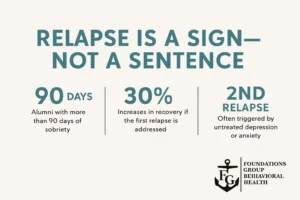You don’t need a lecture.
You don’t need a reminder of how many days you had.
And you definitely don’t need someone telling you to just “get back to meetings.”
Because the truth is, you already know.
You felt it the moment things started to slide.
Maybe it was subtle—skipping one group, ghosting one call, convincing yourself you were “fine.”
Or maybe it was loud. Fast. A crash you didn’t see coming. One minute you were managing life. The next, it was managing you.
Relapse after 90 days hits different. You weren’t new to recovery. You had some peace. A little clarity. You had hope.
So when you slipped, it didn’t just feel like starting over. It felt like shame with a timer—counting all the days you were okay.
But relapse doesn’t mean you’re broken.
And it doesn’t mean you have to do it the same way again.
Sometimes, the next right thing isn’t a return to the old routine—it’s building new support. That’s where medication management can help.
At Foundations Group Behavioral Health, we work with alumni across Cape Cod who need steady hands after a stumble—not shame. Medication is just one of the tools we use to make that support real.
Relapse Is a Sign—Not a Sentence
When relapse happens, the self-talk can get cruel fast:
“I should’ve seen this coming.”
“Why couldn’t I just keep it together?”
“Everyone else seems to be doing fine—what’s wrong with me?”
But here’s the truth: relapse is data. Not damnation.
It tells us something was off. Maybe you were white-knuckling stress. Maybe your depression came back. Maybe your sleep tanked, your anxiety spiked, or the emotional noise got too loud again.
That doesn’t make you weak. It makes you human.
Medication management doesn’t replace the work you’ve done—it supports it. It addresses the things that meetings, routines, and willpower alone can’t always hold.
What Is Medication Management, Really?
Medication management isn’t a last resort. It’s a strategy.
It’s about finding the right support for your brain chemistry, nervous system, and mental health—not handing over control.
At Foundations Group, our medication management team works with you to:
- Review your mental health history and current symptoms
- Identify patterns that may have contributed to relapse
- Explore medications (or medication changes) that could support stabilization
- Monitor progress with frequent check-ins and adjustments
- Work alongside your therapy or recovery plan—not instead of it
This isn’t a “just take a pill and you’ll feel better” approach. It’s slow, safe, collaborative care with a clear goal: to help you feel capable again.
The Shame No One Talks About
Relapse isn’t just hard. It’s quiet.
You might still show up for work. Still smile at your partner. Still say “I’m okay” when people ask.
But inside? You’re spiraling.
You know the steps. You’ve done the work. And now you’re scared to tell anyone what happened—because you’re worried it erases all your progress.
It doesn’t.
In fact, some of the most meaningful progress happens after relapse—when people come back with more self-awareness, better boundaries, and stronger tools.
Medication management can be one of those tools. Not because you failed. But because your nervous system needs backup.
Especially if you’re fighting symptoms you didn’t fully understand the first time around—like trauma responses, clinical depression, bipolar shifts, or ADHD you never addressed.
“I Didn’t Want to Be on Meds. But I Didn’t Want to Keep Feeling Like This Either.”
One of the most common things we hear from alumni:
“I was scared meds would change me. That I’d lose something. My creativity. My edge. My spark.”
But here’s what many discover:
Medication doesn’t flatten you—it helps you stay in yourself.
Instead of spinning out over a small trigger, you breathe.
Instead of lying awake with racing thoughts, you sleep.
Instead of surviving, you start participating again.
That doesn’t mean meds work for everyone. Or that you have to stay on them forever.
It just means that, for some, medication provides the margin needed to rebuild momentum.
Looking for Medication Management in Barnstable County MA?
If you’re in Barnstable County or anywhere nearby, we offer medication management in Barnstable County MA with no judgment, no lectures, and no pressure.
We know that walking through our doors post-relapse takes guts. So we meet you gently—with open ears and clear next steps.
We serve alumni from all recovery paths:
- 12-step
- Smart Recovery
- Therapy-focused sobriety
- People who’ve lapsed once
- People who’ve lapsed more than once
You’re not “starting over.” You’re starting from here. And we’ll work with that.
Medication Can Be a Bridge—Not a Crutch
Some days you feel strong. Other days, everything feels hard. That’s not weakness—that’s recovery.
And when emotional symptoms add weight to that struggle, medication can act like a brace while you heal.
It doesn’t mean you’ll be on it forever.
It doesn’t mean something’s wrong with you.
It just means you’re using what’s available to you.
And if you’re looking for Medication Management in Falmouth MA, our local teams offer discreet, professional, and flexible support—so you can take the next step on your terms.
FAQ: Medication Management After Relapse
Do I have to stay on medication forever?
No. Some people use meds short-term during high-stress periods or relapse recovery. Others find long-term benefit. It’s your choice, and we adjust with you.
Will medication make me feel numb?
It shouldn’t. If you feel emotionally flat or disconnected, that’s a sign we need to adjust your prescription—not a reason to give up.
Can I still go to meetings or therapy if I’m on medication?
Yes—and we encourage it. Medication management complements therapy, peer support, and all recovery tools you already use.
Is medication a sign I failed?
Not at all. It’s a sign you’re committed to recovery in a new way. It’s strength, not surrender.
I relapsed but haven’t told anyone. Can I still come in?
Yes. You don’t need to have it all figured out. We’re here to help—without shame or judgment.
Final Thought: You Can Start Again—Without Starting Over
Relapse is hard. But you are not a lost cause.
You don’t have to do everything exactly the same to move forward.
You don’t have to white-knuckle your way through the next 90 days.
You don’t have to feel alone inside your own recovery.
Medication management is one way to bring stability back—quietly, gently, and with care.
Let’s talk about what’s next.
You didn’t ruin it. You’re not broken. And we’re still here.
Call 888-685-9730 to learn more about our Medication Management services in Cape Cod, MA.









